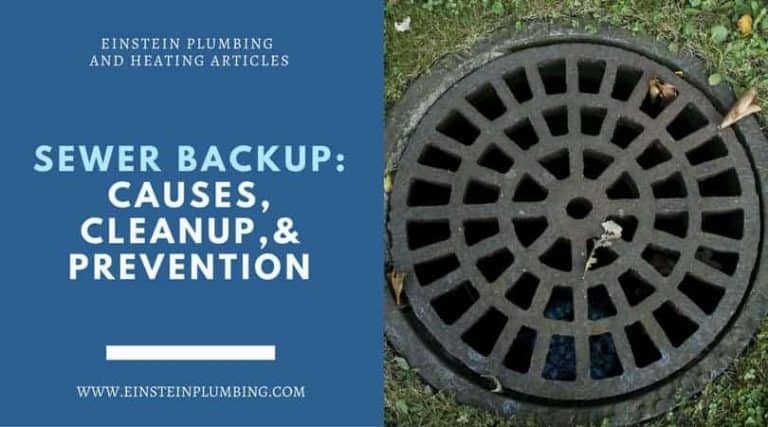A sewer backup or drain clog is a severe problem that can be considered as a plumbing emergency and a threat to your family’s health. If pipes and drains are clogged, and the sewer water has no place to go, it will all come back up into the home’s plumbing system in one way or another. When you have a sewer drain clog, you should not use any of the plumbing in the house until the stoppage is cleared. If you assume that you have a sewer drain clog, it is necessary to confirm this and fix it as soon as possible.
Signs of Sewer Backup
There are various indicators that your sewer system may be backed up or at risk.
- A foul smell coming from drains
- Slow draining laundry lines or bathtubs: gurgling or bubbling in other fixture drains
- Usage of several plumbing fixtures connected to your mainline lead to water backup in places such as toilets or showers
- Basement drains are overflowing
Why do Drains and Sewer Back Up?
Only a professional plumber can spot the reason for your sewage backup problem. Some of the most common causes include:
- Structural defects
- Root infiltration
- Improper toilet flushes (flushed items that don’t belong to the toilet)
- Wet weathers (rains, storms, and floods)
- Flooding around and under your home
- Fats, oils, and grease in your drain
- Pipe blockages
- Leaking or broken pipes
What To Do If My Sewers Backup?
A sewer backup can cause diseases, destruction of your valuables, damage to your home or business, and can even cause an electrical breakdown. Immediate cleanup of the affected area can help minimize the trouble and can prevent mold or further damage. If you experience a sewer backup, the following steps:
- Call the city’s Sewer Maintenance Division and ask them to check the public lines to guarantee that they are free from blockage.
- Call a professional plumber, like Einstein Plumbing, Heating, and Cooling, to have the sewer line cleared.
- Clean up the affected area.
- Wet-vacuuming or removal of spillage
- Thoroughly scrub the affected area with bactericidal disinfectant to remove any trace of dirt or sewage and allow the space to dry
- Flush out and disinfect plumbing fixtures
- Steam clean or remove and discard any solid waste or contaminated materials, including carpets, drapes, or furniture which have come into contact with the sewage
- Repair or remove damaged wallboard or wall covering
- Cleanup of ductwork
- Reach your insurance provider within 24 hours of the sewer backup to start the claim process
How to Prevent Sewer Backups?
There are several ways to prevent or decrease the risk of a sewer backup. Some preventative maintenance will help keep your sewer system clear, while other methods reduce the risk of storm-related backups.
1. Install Backflow Prevention Valves / Sump Pump – If your property is in a low lying place or near a lake or river, we strongly suggest that you install a sump pump. A sump pump will help you drain groundwater from under and around your basement floor, reducing the risk of basement floors cracking and moving from water pressure.
2. Dispose of FOG (fat, oil, grease) Properly – Avoid pouring cooking oil into your sink. Instead, use a heat-resistant container and dispose of it properly.
3. Dispose of Paper Products Properly – Refrain flushing these items down your toilet: paper towels, feminine products, disposable/cloth diapers, and other small objects as they lead to clogs.
4. Replace Pipes – Older homes are more susceptible to sewer backups because some older trees and shrubs have roots searching for water and moisture leading to the crack in the sewer line and blockage. To avoid this, you should cut the roots regularly and consider replacing the pipeline and tap pipes with plastic.
5. Proper Drainage – One of the most effective methods to prevent flooding is to make sure that there is an appropriate drainage around your property. Also, clean your pipeline as a preventative measure to help with water flow, reducing the risk of sewage backup.
Start looking out for early signs of a sewer backup and remember, if sewage backups, it’s time to call a professional plumber! Contact Einstein Pros at 888-671-7767. We have the experienced sewer solutions specialist in Oregon, Washington, and Nevada. For an expert plumbing, water heater, heating & cooling, sewer & mainline solutions, we are THE SMART CHOICE.
